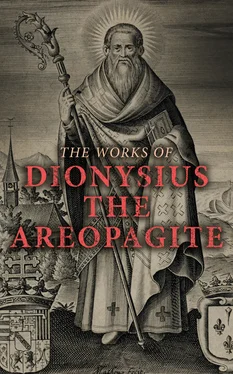I cannot but believe that many of the beautiful expressions about Vishnu, the Redeemer, in the Râmâyana of Tulsidâs are Christian Truths under a Hindu dress 9. Many learned Hindus affirm that it is needless for them to become Christian, because they have a more exalted conception of the Supreme God than Christians themselves. I submit that the “Divine Names” will be instrumental in bringing India to the Christian Faith, in the best and only effectual way—by communities and not by individuals—through the most learned and devout, and not through the most ignorant.
Dionysius was first converted, and then, through him, those who naturally and properly followed his lead.
LUCIUS FLAVIUS DEXTER.
Dexter was a friend of Jerome. Jerome even addresses him as “filius amicus,” and describes him as “clarus apud saeculum et Christi fidei deditus.”
Dexter became Prefect of the Pretorian Oriental Guards, and was one of the most illustrious statesmen of his time. He resided two years in Toledo. From the archives of the Church of Toledo and other cities he compiled a chronicle from A.D. 1 to A.D. 430, giving a brief summary of the Church events in Spain. That chronicle he dedicated to Jerome, who, enrolled both Chronicle and Author amongst his “illustrious men.” It was at the request of Dexter that Jerome wrote his book on Ecclesiastical Writers. Among the earliest Bishops of Toledo, Dexter describes a remarkable man,—Marcellus,—surnamed Eugenius, on account of his noble birth.
Bivarius says he was of the house and family of Caesar, being uncle to the Emperor Hadrian. Marcellus was consecrated Bishop by Dionysius the Areopagite at Aries, and sent to Toledo. Respecting him, Dexter records that Dionysius dedicated the books of the Divine Names to him, u.c. 851, A.D. 98. Dexter further records that Dionysius surnamed Marcellus, Timothy, on account of his excellent disposition. Polycrates, Bishop of Ephesus, relates that Timothy, Bishop of Ephesus, to whom the works of Dionysius were originally dedicated, was martyred during the reign of Nerva, A.D. 96-97. Upon the return of Dionysius to Gaul, after his visit to St. John, released from Patmos, we find him calling his friend Marcellus, Timothy, and presenting the books of the “Divine Names “to him, A.D. 98; in order that he might still have a Timothy on earth,— “in vivis”—although his first Timothy, “migravit ad Christum,” A.D. 97.
This touch of nature, preserved in a chronicle, written more than 1400 years ago, by an illustrious statesman, who was son of a Bishop celebrated for learning and sanctity, may fairly be deemed, by an unprejudiced mind, reasonable proof that the “Divine Names” were written previous to A.D. 98.
N.B. As the result of some research I affirm that our Saviour’s last commission is the Key to Church history in the first century. As He commanded the Apostles to preach the Gospel throughout the world, so the Gospel was preached when St. Paul wrote his Epistle to the Colossians, Chap. I. v. 23 (τοῦ κηρυχθέντος ἐν πάσῃ κτίσει), and with such success amongst the most learned and noble, that, but for the cruel massacre of Flavius 10Clemens and his family for the Christian Faith, there would have been a Christian Emperor in the first century. As Jesus said, “Ye shall be witnesses of Me unto the uttermost parts of the earth” (Acts Chap. 1. v. 8), so the Apostles planted the Church of Christ in Gaul, Spain and Britain, with its threefold ministry; and by the end of the second century there was an organised Church throughout each of those territories 11.
Dr. Schneider informs me “that in Germany they now admit that the external proofs are in favour of genuineness of Dionysius, but they confine themselves to the internal proofs. They pretend that the doctrine is too clear and precise to have been written in the apostolic age.”
How could the chief Areopagite, the convert and companion of St. Paul, and the familiar friend of St. John, Theologus, have understood theology!!
2C. V. § 2.
3Ἀδελφόθεος.
4Θεοπάτορ.
5As beyond knowledge.
6Conversion of India, p. 12. Pressensé, The Earlier Years of Christianity, Vol. II. p. 271. The History of Mathurâ (Muttra), by F. S. Growse, on the glorification of the Divine Name.
7Vidieu, p. 73.
8Sankara’s doctrine, Sir Monier Williams, “Brahmanism,” p. 55. Râmânuja’s explained, “Brahmanism,” p. 119, &c. J. Murray.
9At Council of Nicea in 325, Johannes, the Metropolitan of Persia, signed also as “of the great India.” Merv was an Episcopal See, A.D. 334. Con. of India, pp. 15—31.
10Burton, Ecc. Hist., Vol. I. p. 367.
11Mansi I. 698, Jaffi. Regesta Rom. Pon. 2nd Ed., p. 10, by Ewald.
Table of Contents
TO MY FELLOW PRESBYTER, TIMOTHY,
DIONYSIUS THE PRESBYTER.
What is the purpose of the discourse, and what the tradition concerning Divine Names.
SECTION I.
Now then, O Blessed One, after the Theological Outlines 12, I will pass to the interpretation of the Divine Names, as best I can.
But, let the rule of the Oracles be here also prescribed for us, viz., that we shall establish the truth of the things spoken concerning God, not in the persuasive words of man’s wisdom, but in demonstration of the Spirit-moved power of the Theologians, by aid of which we are brought into contact with things unutterable and unknown, in a manner unutterable and unknown, in proportion to the superior union of the reasoning and intuitive faculty and operation within us. By no means then is it permitted to speak, or even to think, anything, concerning the superessential and hidden Deity, beyond those things divinely revealed to us in the sacred Oracles 13. For Agnosia, (supra-knowledge) of its superessentiality above reason and mind and essence—to, it must we attribute the superessential science, so far aspiring to the Highest, as the ray of the supremely Divine Oracles imparts itself, whilst we restrain ourselves in our approach to the higher glories by prudence and piety as regards things Divine. For, if we must place any confidence in the All Wise and most trustworthy Theology, things Divine are revealed and contemplated in proportion to the capacity of each of the minds, since the supremely Divine Goodness distributes Divinely its immeasurableness (as that which cannot be contained) with a justice which preserves those whose capacity is limited. For, as things intelligible cannot be comprehended and contemplated by things of sense, and things uncompounded and unformed by things compounded and formed; and the intangible and unshaped formlessness of things without body, by those formed according to the shapes of bodies; in accordance with the self-same analogy of the truth, the superessential Illimitability is placed above things essential, and the Unity above mind above the Minds; and the One above conception is inconceivable to all conceptions; and the Good above word is unutterable by word—Unit making one every unit, and superessential essence and mind inconceivable, and Word unutterable, speechlessness 14and inconception 15, and namelessness—being after the manner of no existing being, and Cause of being to all, but Itself not being, as beyond every essence, and as It may manifest Itself properly and scientifically concerning Itself.
SECTION II.
Concerning this then, as has been said, the superessential and hidden Deity, it is not permitted to speak or even to think beyond the things divinely revealed to us in the sacred Oracles. For even as Itself has taught (as becomes Its goodness) in the Oracles, the science and contemplation of Itself in Its essential Nature is beyond the reach of all created things, as towering superessentially above all. And you will find many of the Theologians, who have celebrated It, not only as invisible and incomprehensible, but also as inscrutable and untraceable, since there is no trace of those who have penetrated to Its hidden infinitude. The Good indeed is not entirely uncommunicated to any single created being, but benignly sheds forth its superessential ray, persistently fixed in Itself, by illuminations analogous to each several being, and elevates to Its permitted contemplation and communion and likeness, those holy minds, who, as far as is lawful and reverent, strive after It, and who are neither impotently boastful towards that which is higher than the harmoniously imparted Divine manifestation, nor, in regard to a lower level, lapse downward through their inclining to the worse, but who elevate themselves determinately and unwaveringly to the ray shining upon them; and, by their proportioned love of permitted illuminations, are elevated with a holy reverence, prudently and piously, as on new wings.
Читать дальше












